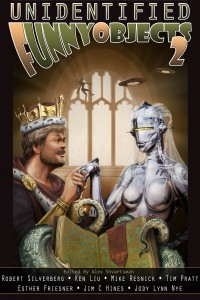written by Frank Dutkiewicz
Welcome to the only ezine publication that takes the time to review all of the stories of one of the most read speculative publications, and most submitted to professional publishers, Daily Science Fiction. We are proud to be able to show DSF, and its celebrated authors, that their work is read , and studied. For three years we have held true to our commitment that Daily SF should not be ignored. They shouldn’t. The material is too good to be overlooked. But don’t take our word for it. See for yourself.
When the Selkie Comes by Sylvia Spruck Wrigley (debut 9/2 and reviewed by Dustin Adams).
This flash story is about a young girl suffering the loss of her best friend / girlfriend. Her mind can’t fully accept that she’s gone, especially because of bullying, so she invents a world of magic around herself like a protective bubble, imagining her friend has gone to a better place.
I wasn’t able to escape into the fantasy because this tale was true-to-life. Magic is mentioned, but doesn’t play a part. I wish it had, because I was hoping for some sort of redemption, but instead we just have a very sad, very real story.
The Velveteen Rabbit Says Goodbye by Melissa Mead (debut 9/3 and reviewed by Dustin Adams).
I’ve had the pleasure of reviewing many of Melissa Mead’s altered fairy tales, but this one leaves them all behind. If you read only one, make it this one.
The Velveteen rabbit is sent to his Boy, who has been sent to war. While there, he sees horrible things, but his job is simply to be there for his Boy, as well as for others, because they need him.
RECOMMENDED
A carnival attraction draws an inquisitive customer in The Vanishing Girl by Michael T. Banker (debut 9/4 and reviewed by Frank D). For two dollars, a girl promises to make something you offer to disappear. Her magical touch delivers. Intrigued, he offers her something friendly. Big mistake.
“The Vanishing Girl” is a tale I read when it first appeared in a writer’s group contest. The ending is quite abrupt, and fitting.
A tribute of a town’s savior shows up at the doorstep of a young lady’s home in The Witch’s Cat by Kalisa Ann Lessnau (debut 9/5 and reviewed by Frank D). The companion of a Witch takes to the protagonist when its master dies. The Witch did much for the town. The people she helped all whisper their thanks to the cat (named Sampson) as the protagonist walks tours the community. Sampson contributes to the bonfire while the town performs one last tribute to the Witch, surprising them all, but the magic of the witch has not stopped giving, after all.
“The Witch’s Cat” is a tale that had me guessing throughout. The Witch had left a lasting mark on the local people, she being an icon like many leaders throughout history. I really had no idea where this story was heading and its conclusion is one that I whole-heartedly approve of. Very nice work indeed.
RECOMMENDED
The old Angel of Death appeals to the new angel to spare humanity. In Dark Angel, Archangel by Kevin J. Anderson (debut 9/6 and reviewed by Frank D), the Grim Reaper has lost his job to the White Lady. He has refused to exterminate humanity and has been stripped of most of his power. The White Lady has no such qualms. Angels of Deaths have been replaced before – mass extinctions having rendering the previous angel useless. The Reaper intends to not let humanity fade from Earth. He knows why the rest of the aurorae want man to perish. The aurorae will have much to fear, if he can convince the White Lady why man should survive.
“Dark Angel” is a supernatural tale with a very different premise. The otherworld beings are products of the Aurora Borealis. The fear humanity feels for the Angels of Death have made them powerful, too powerful for the beings that have created them. The story becomes a battle, ending in a self-sacrificing act to prove a point.
Frankly, I found this story to be a stretch, even for a speculative audience. It read like a mash up of concepts that floated around in the author’s head.
A letter of concern (complete with footnotes) is sent to the people of Earth in Uh†� Guys? by Luc Reid (debut 9/9 and reviewed by Frank D). Aliens send us a message in a lingo that we can all understand, you dig?
I found this amusing tongue-and-cheek message piece entertaining.
A man follows a character of importance in Tunnel Vision by Zach Shephard (debut 9/10 and reviewed by Frank D). The protagonist tails a woman he identifies as ‘The Protagonist’. He passes by other characters with wild stories of their own, but he is unconcerned about them. She alone has captured his interest.
“Tunnel Vision” is a story of a viewer focused on a single person. The tale is strange, told as if a reader is living in the imaginative world of another’s creation. The people he passes have incredible and compelling tales of their own, tales he ignores.
This story has a disconnected and odd premise to it. Surreal, yet interesting.
The cycles of the tides have a feminine influence in Ebb and Flow by La Shawn M. Wanak (debut 9/11 and reviewed by Frank D). Megan waits at the shore, watching the tide come in as a hint to know when her time has arrived.
This premise is based on a switch on the attraction of the tides , it is a woman’s menstruation cycle and not the moon’s gravitational influence. Interesting, but silly.
A vampire craves to see the sun in Finally Free by Frances Silversmith (debut 9/12 and reviewed by Frank D). This brief tale explores the motives of a vampire who has lived in the dark for far too long.
Short and sweet.
A failed artist tries to find his purpose in a world filled with androids in The Titanium Geisha by Elias Barton (debut 9/13 and reviewed by Frank D). Wil Feld is the oldest child of a family of accomplished artists. A failure who spends his days on the beach eating hot dogs, Will is bitter and adrift – a boat without a rudder – as he attempts to sail through life as his siblings have. He awaits his perfect mate, a companion android he had picked out in the design specs of an android corporation. When Fern appears on the beach, she isn’t what he expected. She turns out to more than he could have imagined.
“The Titanium Geisha” is a story reminiscent of Philip Dick’s classic Do Androids Dream Electric Dreams? , the story that begat Blade Runner. Fern proves to be just the person Will needs, a mate who challenges an artist who has come to avoid challenges. Fern attempts to blossom Wil’s creative side, but Wil has not the insight, nor the desire his siblings have had all along. The world is clinical to him. Where others see beauty, he finds the practical.
“Titanium Geisha” is long tale for Daily SF. It is long in set up with a reveal that takes a long and winding path to reach its conclusion. The tale is a cleverly disguised mystery. There are clues within the story that should have made the twist obvious but the slow pace and complicated romance does a rather good job of hiding the clues in plain sight. The protagonist is drawn as a privileged jerk, too comfortable in his own self-pity to attempt to move beyond his own short comings. He makes it difficult as a character for a reader to rootfor, which is a shame.
“The Titanium Geisha” is a story with a solid premise. The tale is an intriguing one but one that is difficult to stick with.
Pavlov’s Final Research by Gary Cuba (debut 9/16 and reviewed by James Hanzelka).
The old man stood on shaky legs, his bones creaking with the effort, and shambled over to the door. “What do they want of me now?” He thought. He opened the door to reveal his old friend, Sergi. “Have you come to tell me they have stopped my stipend after all these years?” Pavlov asked. “Not at all, old friend.” Sergi said. “In fact Stalin wants to honor you as his predecessor has done, but he needs to know about your new work.” Pavlov agreed and led Sergi into the kitchen to observe his latest work, a new approach to conditioning. But who was training who?
This story is a little trite and predictable, but it is well written and the humor comes through nicely. The writer has done a credible job with setting up the premise and drawing the reader into the story. It could probably have used a better punch line, but it is still worth the read.
Virtually Human by Melanie Rees (debut 9/17 and reviewed by James Hanzelka).
The boy held up the pills, offering one to Miranda. She refused and he popped one in his mouth. “You know you want one,” he said. Miranda refused, stumbling over her words, “I can’t.” His look carried the accusation of cowardice. “Mother would be angry.” Still she is on the verge of succumbing to the temptation when the footsteps on the stairs alert her. “End program,” she commands and the boy fades away.
This was an interesting take on perception and what we seek for in life. The author does a good job of drawing us into the character. And while there are some early issues with gaps in the action that I found disconcerting, overall the story is well written. I liked the way the author changed our view of the world as she changed the perspective of the character. Worth the read.
A painter deconstructs his own work in Artist’s Retrospective by David D. Levine (debut 9/18 and reviewed by Frank D). A customer delivers a painting to an artist’s gallery , a caption of a fruit bowl. The painter accepts it and strips down to the point of his inspiration.
“Artist’s Retrospective” is a walk backwards in creation. The story is told in a time reversal, a tale of rediscovery in the eyes of a creator. The piece (story) is a work of a master. Mr. Levine shows off his own artistry as he leads the reader on a path of inspiration and talent , in reverse. Well done.
RECOMMENDED
A scientist confesses his crime in Those Little Slices of Death by Susan Lanigan (debut 9/19 and reviewed by Frank D). An inventor removes the magnet in his skull that neutralizes the need for sleep. The result is intoxicating.
This futuristic message piece is written as a commentary of our current political times. Not a bad story but reading the author’s inspiration kind of soured it for me.
Unicorns, and Other Birthday Hazards by Jeffery John Hemenway (debut 9/20 and reviewed by Frank D). It’s Greta’s twelfth birthday, and that makes her a dangerous girl. Monsters inhabit her town, brought about by the birthday wishes of little children. The adults need her to fix this with a wish, but she knows that won’t make things better, just worse. But Greta knows what to do because she’s the one that made birthday wishes possible in the first place.
Greta is a prisoner in her own attic as a large man stands guard. Outside unicorns and ponies of all shapes and color rule the grounds. They are the results of wishes small children have made, but no wish comes without a consequence. Greta learned that the day she first found the gnome, and has been planning ever since to undo what she had done long ago.
“Unicorns” is a tale of unintentional consequences. She had intended on saving her sick sister with her first wish, but the gnome had warned her of its consequences. The story is a fast moving tale full of unexpected twists and turns. The quick pace and unseen corners is a telling that was right up my alley, making it a complete pleasure for me to read. My only gripe is the ending left me with unanswered questions. Nevertheless, it was a solid and entertaining read.
An editor wants his science fiction writer to make his novel more believable in Worldbuilding by Alex Shvartsman (debut 9/23 and reviewed by Frank D). Peter calls in Bob to nit-pick small details in his latest work.
This short piece has a twist made for the lovers of speculative fiction.
The Gifts: Parts 1 -3 by Mari Ness (debut 9/24-26 and reviewed by Frank D), is a tale told around the Grimm fairy tale, The Girl with Silver Hands. Each part is told from a perspective of one of the major players in the tale.
In Part One (debut 9/24), the protagonist is given a chest from his daughter, filled with gold and a pair of silver hands. The gold is his, but it cannot be touched by his own hands.
In Part Two (debut 9/25), we see the prequel to Part One. The girl with stumps for arms is given the silver hands as a gift by her prince, her husband, and protagonist of this tale.
This flash gathers a glimpse of the girl and how her silver hands are given as a gift to her father.
In Part Three (debut 9/26), is the finale as seen through the eyes of the girl with stumps for arms. She watches as her prince , the man she had left , slices off her father’s hands on the chest full of gold.
The original tale (there are many variations, according to my research) is dark like many of the Grimm brother’s tales. Ms Ness’s adaption is told with an alternate ending as an epilogue to the original tale. These three brief adaptions are presented in a slightly darker shade as the already grim fairy tale.
Like many of the fairy tale adaptions told here at Daily SF, the author holds true to the tone of the original piece while spinning it in their own style. Not bad, for a bleak and harsh children’s story.
A ghost girl and a man seeking resurrection for his wife seek a planet of dreams in Marrakech Express by Milena Benini (debut 9/27 and reviewed by Frank D). The planet of Zaria is a world where the dead can live on in the space in which dreams exist. Mari is a spirit whose form exists in the presence of her parents. Karima intends on making the sun run for her daughter. Christian Chankari is a man who has used the services of a smuggler , Harry the Slut. Together, they travel aboard the Marrakech Express to Zaria so Christian can bring his departed wife to Zaria.
“Marrakech Express” is a dual plot story. The twin stories surrounding Mari’s ghostly form and the exploits of Harry the Slut have very little in common. Each storyline follows a confusing path until the characters meet in the climax of the piece.
I found this story to be a difficult one to get through. The characters all have odd motives. The rules of the dream state and how they related to the dead I couldn’t make heads or tails out of. The story is slow and underdeveloped. I just couldn’t understand why these people made the choices they made.
Not my cup of tea.
An old woman has a soft spot for children, one she has been suppressing for a very long time. How Hagatha One-Eye Fell Off the Wagon by Matthew Cote (debut 9/30 and reviewed by Frank D) is a tale of a reclusive and old woman. She holds tight to a coin stamped with a 200, the time she has remained on the wagon. An older boy performs a breaking and entering on her place, challenging her resolve and will power.
“How Hagatha” is a take on the ole Hansel and Gretel fable. I found it inventive and a pleasure to read.
RECOMMENDED
Looking for a little exposure?
Have a book, event, blog, or product you’d like to showcase? Looking for a way to spread the word on your awesome idea? Is there a specific group (like sci-fi or fantasy readers) you’d like to target? Welllll, why not paste an ad in a distributor that hits the email inboxes (not spam) of several thousand’s every day. A publication that attracts loyal readers, dedicated readers, and committed readers of speculative fiction. What is this wonderful place? Let’s see†�had the name on the tip of my tongue†�wrote it down somewhere†�don’t tell me†�Here it is!
DAILY SCIENCE FICTION!
Not sure how to contact them. I’ll leave up to the bio guy.
 Daily Science Fiction is a popular, professional venue for both science fiction and fantasy. Unlike other online professional magazines, we email stories to our subscribers each weekday. This provides a unique opportunity to reach a set group of dedicated genre readers on their “home turf,” in their inbox, where they’ve invited us to share.
Daily Science Fiction is a popular, professional venue for both science fiction and fantasy. Unlike other online professional magazines, we email stories to our subscribers each weekday. This provides a unique opportunity to reach a set group of dedicated genre readers on their “home turf,” in their inbox, where they’ve invited us to share.
We’re in our fourth year of publication, an established and reliable place for fans to find top names in the field and exciting new authors. The Daily Science Fiction website gets about 65,000 page views every month, reaching more than 12,000 unique readers. Our email subscriber list exceeds 7,500.









